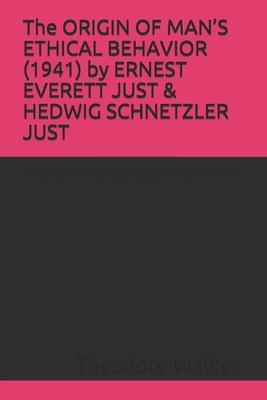"The Origin of Man's Ethical Behavior" (unpublished manuscript, 1941) was co-authored by biologist Ernest Everett Just and research-associate-philosopher and spouse Hedwig A. Schnetzler Just.
In the opening chapter "The Problem Stated," they reject the idea that moral theory (theory of ethics) should be restricted to religion and philosophy. Just and Just say:
"... we intend to treat ethics as a problem in biology ... It is within the field of biology, then, that we locate human ethics, or better to say, man's ethical behavior" (Just and Just 1941: 2-3 [also 4, 91, 146]).
Here, theory of evolution is profoundly enriched and advanced by linking
(a) primitive cellular origins and subsequent evolution of physical structures and functions to
(b) primitive cellular origins and subsequent evolution of spiritual relations and ethical behaviors.
The origin and evolution of human organic physicality is mutually dependent upon the origin and evolution of spirituality and ethics.
Theory of ethical behavior is essential to efficacious theory of organic evolution.
----
"... the efficacy of any theory of the cause of organic evolution is measured by the degree to which it is capable of sustaining the superstructure of a theory of the origin and evolution of man's ethical behavior" (Just and Just 1941: 16).
----
Evolutionary biology and evolutionary ethics require each other.
Here also is a pioneering formulation of the law of environmental dependence.
Governed by a comprehensive law of environmental dependence (upon cooperative interactivity with others and with the living environment), and in tandem with the evolution of biophysical structures and functions, ethical behavior "evolved" from our "very most primitive fore-runner" (Just and Just 1941: 12 [also 17]), from cells to humans.
Evolutionary biology + evolutionary ethics = evolutionary bioethics.
And with appreciation for evolution as a continuing process, and despite E. E. Just's life-long experiences with Anglo-American anti-black racism and his August 1940 internment and September 1940 dramatic escape from Nazi-occupied France, Just and Just conceived that humanity is "on the threshold" of further evolution in ethical behavior (Just and Just 1941: 176).
Tragically, E. E. Just died (from pancreatic cancer in October 1941) before finding a publisher willing to print a book connecting biology to ethics and environmental dependence (decades before bioethics and environmental relations were popular concerns). And the 1941 manuscript was lost to the public.
Fortunately, nearly 77 years later, among the collected papers of Ernest Everett Just at the Moorland-Spingarn Research Center at Howard University, pages and copies of pages from this unpublished book manuscript (onion-skin and carbon copies of typed pages, plus typed and handwritten pages; minus annotated bibliography, lab notes, graphics, and final pages of chapter 9) were found, identified, reassembled, and transcribed from ink-on-paper to Word documents created by Theodore Walker Jr. and Lillie R. Jenkins during the spring and summer of 2018. And through 2019-2020, there was further transcribing (plus adding final pages of chapter 9 from previously discovered, by Kenneth R. Manning, handwritten drafts) and co-editing by Walker, Jenkins, and W. Malcolm Byrnes, in consultation with Stuart Newman, Kenneth R. Manning, Charles H. Long, and Moorland-Spingarn curator of manuscripts Joellen ElBashir.
This book is soon to be published with supplemental commentaries under a gender inclusive (and evolution inclusive) title and subtitle: The Biological Origin and Evolution of Ethical Behavior: From Cells to Humans (2020 or 2021). Meanwhile, this July 2020 archival edition retains the original title, and original manuscript page breaks and numbers.
